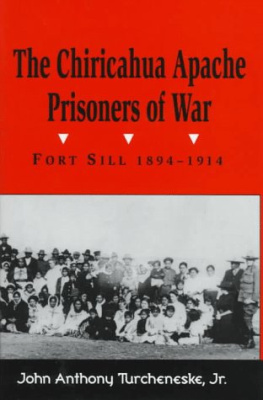The Chiricahua Apache Prisoners of War: Fort Sill, 1894-1914
by Turcheneske, John Anthony.
University Press of Colorado, 1997
ISBN10: | asin: 0870814656
ISBN13: 9780870814655
eISBN13: 9780585030548
lcc: E99.C68T87 1997eb
ddc: 976.6/004972
subject: Chiricahua Indians--Relocation--Oklahoma--Fort Sill, Chiricahua Indians--Cultural assimilation, Chiricahua Indians--Government policy, Indian prisoners--Oklahoma--Fort Sill, Indians, Treatment of--Oklahoma--Fort Sill, United States--Politics and government
The Chiricahua Apache Prisoners Of War
Fort Sill 1894-1914
John Anthony Turcheneske, Jr.
UNIVERSITY PRESS OF COLORADO
1997 by the University Press of Colorado
Published by the University Press of Colorado
P. 0. Box 849
Niwot, Colorado 80544
All rights reserved. Printed in the United States of America.
The University Press of Colorado is a cooperative publishing enterprise supported, in part, by Adams State College, Colorado State University, Fort Lewis College, Mesa State College, Metropolitan State College of Denver, University of Colorado, University of Northern Colorado, University of Southern Colorado, and Western State College of Colorado.
Library of Congress Cataloging-in-Publication Data
Turcheneske, John Anthony, 1943
The Chiricahua Apache prisoners of war: Fort Sill, 1894-1914 / John Anthony Turcheneske, Jr.
ISBN 0-87081-465-6 (casebound: alk. paper).
1. Chiricahua IndiansRelocationOklahomaFort Sill.
2. Chiricahua IndiansCultural assimilation. 3. Chiricahua IndiansGovernment policy. 4. Indian prisonersOklahomaFort Sill. 5. Indians, Treatment ofOklahomaFort Sill. 6. United States politics and government. 1. Title.
E99.C68T871997
976.6'004972dc2097-16012
CIP
This book was set in ITC Slimbach and Broadband ICG by Stephen Adams.
Dedicated to my mother and father,
Mary Elizabeth Driscoll-Turcheneske and
John Anthony Turcheneske, Sr.
Contents
. Uprooted: An Innocent People Are Taken Captive
. An Exile of Despair in Florida and Alabama
. Vigorous Protests Are Raised Against Locating the Chiricahuas in Oklahoma
. The Chiricahuas Settle in at Fort Sill
. Enlargement of Fort Sill for the Chiricahuas' Eventual Allotment
. Daily Routine, a False Alarm, and Missionaries
. A Subtle Policy Shift
. Initial War Department Maneuvers to Retain Fort Sill as a Military Reserve
. Undercurrents of Chiricahua Disaffection
. Opening the Way to Removal From Fort Sill: Geronimo's Demise and Agitation for Relocation to New Mexico
. Foreclosure of Chiricahua Rights to Fort Sill: Establishment of the U.S. Army Field Artillery School of Fire
. A Promise "Broken to the Hope"
. Military Functionaries Find a Friend in the House
. Senatorial Subterfuge Nearly Scuttles the Chiricahua Resettlement Scheme
. Resettlement at Mescalero and Release From Military Custody
. Liberated Into Penury: A Most Parsimonious Chiricahua Allotment in Oklahoma
Quest for Freedom: A Case of Justice Denied
Figures
| 1. | . |
| 2. | . |
| 3. | . |
| 4. | . |
| 5. | . |
| 6. | . |
| 7. | . |
| 8. | . |
| 9. | . |
| 10. | . |
| 11. | . |
| 12. |
| 13. | . |
| 14. | . |
| 15. | . |
| 16. | . |
| 17. | . |
| 18. | . |
| 19. | . |
| 20. | . |
| 21. | . |
| 22. | . |
| 23. | . |
| 24. | . |
| 25. | . |
| 26. | . |
| 27. | . |
| 28. | . |
| 29. | . |
| 30. | . |
| 31. | . |
| 32. | . |
| 33. | . |
| 34. | . |
| 35. | . |
| 36. | . |
Preface
The Chiricahua Apache prisoner-of-war saga, a little-known episode of which much was played out at Fort Sill, Oklahoma, occupies a unique niche in Native American history. In the first place, during the final Apache hostilities that occurred in the Southwest in 1886, none of the nearly 400 Chiricahuas so callously and cynically uprooted and exiled from their San Carlos, Arizona, home aided Geronimo and his small band of fellow belligerents. Yet, for a twenty-seven-year period, from September 1886 through early March 1914, these Chiricahuas were collectively punished for both his and his confederates' crimes. Equally egregious, they were held hostage to the whims of economic, political, and military expediency pursued by both War Department officials and Southwestern politicos, who were held in thrall by the presidential administrations of Grover Cleveland through William Howard Taft. Even more reprehensible, prisoner-of-war status was visited upon numerous innocent Chiricahua children born into captivity.
Despite these ignominies, the real tragedy that befell the Fort Sill Chiricahua prisoners of war was that a positive effectuation of the federal government's assimilationist goalson one of the few occasions that this might have been possiblewas ultimately denied them. Although army personnel promised the Chiricahuas, upon their arrival at this post, that Fort Sill would become their permanent home (indeed, President Grover Cleveland signed an 1897 executive order to this effect), War Department officials repudiated this commitment more than a decade later and instead transformed this military reserve into its field artillery training installation.
During the Chiricahuas' captivity, concerned officers-in-charge decided that the best route to their assimilation with white society might be cattle raising. The soundness of this proposal and the success of the endeavor were soon demonstrated. By 1897, the Chiricahuas had more than 1,000 head of cattle. By 1913, just prior to the removal from Fort Sill of those Chiricahuas slated for relocation to the Mescalero Indian Reservation in New Mexico, these Indians were made to sell their 10,000 head of cattle at a loss, which effectively pulled the economic rug out from under them.
This forced sale, which derailed their assimilation and future prosperity, wreaked economic havoc upon the Chiricahuas. As Raymond Loco so eloquently, albeit bitterly, explained, had the government permitted them to retain Fort Sill and the cattle herd, they might well have become the most prosperous tribal entity in Oklahoma. Instead, the Chiricahuas were evicted from Fort Sill. Each was givenelsewherean allotment smaller than the 160 acres originally intended. Consequently, according to Mildred Imach Cleghorn, her people found themselves "land poor." Even had each of these Indians obtained a 160-acre allotment, a tract this size would still not have been sufficient to provide the Chiricahuas with a viable economic base for self-sufficiency, either as individuals or as a whole. Ironically, even the most belligerent Native American groups did not suffer quite the same privations as the Fort Sill Chiricahua Apache prisoners of war. Hence, within the overall framework of U.S. government-Native American relations, the twenty-seven-year Chiricahua captivity the last twenty years of which were spent confined as prisoners of war at Fort Sill, Oklahoma represents an unprecedented and unconscionable case of injustice.
John Anthony Turcheneske, Jr.
River Falls, Wisconsin
Acknowledgments
Next page




